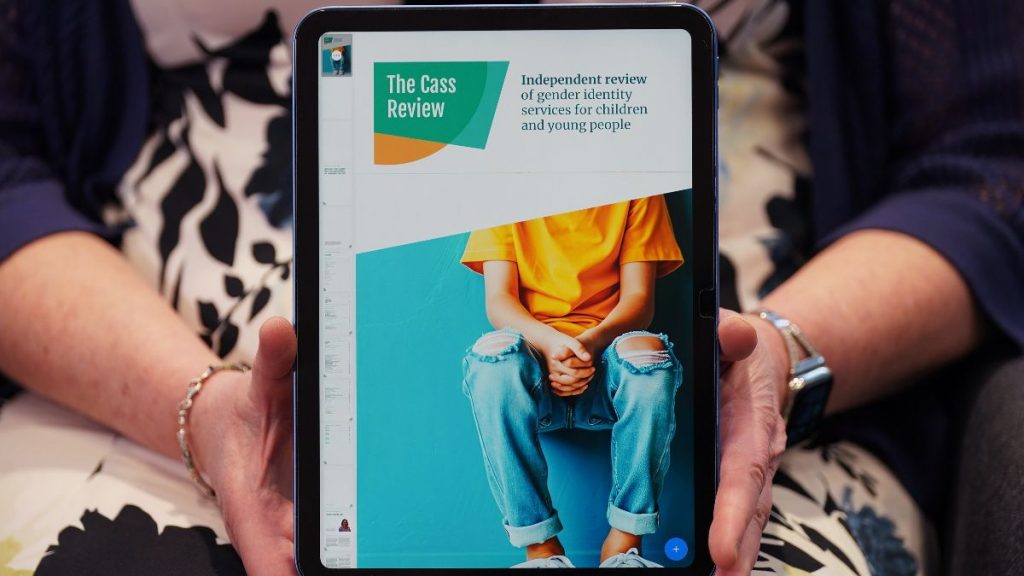Two years ago we reported about the interim Cass Review issued by the UK’s NHS, in which pediatrician Dr Hilary Cass graded Tavistock’s GIDS (Gender Identity Development Service), the UK’s only gender clinic, as “Inadequate”, which is the lowest possible rating. The final review has finally been published this April and is very wide in scope, since Dr Cass reviewed all the available evidence on which the so-called gender medicine has been based. Another question she tried to answer is why the past years have seen an exponential rise in gender dysphoria in children and teens, with girls being in the majority.
Dr Cass has concluded that children have been “let down” because the gender care they were given was not based on sound research, noting that the entire debate was marked by “toxicity” as professionals refrained from openly discussing their views due to fears of “being called transphobic if you take a more cautious approach” or be accused of conducting “conversion therapy.” As a reminder, the review was initiated after several whistleblowers raised concerns that patients were being “fast-tracked” and “rushed” into gender affirmative treatments at the GIDS.
In the foreword to her report, Dr Cass address young people, “I have been disappointed by the lack of evidence on the long-term impact of taking hormones from an early age; research has let us all down, most importantly you. The reality is we have no good evidence on the long-term outcomes of interventions to manage gender-related distress.”
GIDS finally closed last week and since the interim review regional hubs were opened in London and Liverpool. However, in the final review, Dr Cass says that future clinics should not have the word “gender” in the name since we should “move away from just calling these gender services because young people are not just defined by their gender.“ She believes that future clinics should offer a vast range of interventions, instead of having “tunnel vision” on gender.
The chilling effect in society – fear of being “cancelled” or called transphobic when raising any concerns or apprehension – has resulted in harm to hundreds of children who were told that the fact that they are exploring their gender, which is “a normal process” in adolescence according to Dr Cass, were in fact transgender and required hormonal and other medical treatments. She also mentioned concerns about “diagnostic overshadowing”, namely, the many cases when patients’ other healthcare issues were overlooked and the focus was placed solely on them questioning their gender identity.
Young people referred to the clinics should have a “holistic assessment”, including screening for neurodevelopment conditions since many gender patients were found to have autism, OCD, anxiety and other mental health issues.
Dr Cass’ earlier research has resulted in the NHS deciding to stop prescribing puberty blockers to children outside research trials, while the new research recommends “extreme caution” before such treatments are prescribed to children under 18 since there should be a “separate pathway” of care for those who have yet to hit puberty. With the final report seeing the light of day, British Government responded swiftly, with victims and safeguarding minister Laura Farris saying that there would be a “fundamental change of direction” in gender care.
A long section of the review explores the causes underlying the surge in the number of referrals to GIDS. “It’s a social experiment – we don’t know what that’s done for the generation that’s coming through – what has been good and what is bad,” she said.
“Biology hasn’t changed in the last few years so it’s not that that’s changed things … We do have to think very seriously about the impact of social media, not just in terms of influencers, but about the effect of long hours on social media”, Dr Cass noted.
She also highlighted the danger of inserting a wedge between children and their parents and keeping parents in the dark about gender identity issues in their children: “Some were told parents would not understand so that they had to actively separate from their parents or distance their parents; all the evidence shows that that family support is really key to people’s well-being.”
Dr Cass noted that she also wanted to determine how many children have been harmed by hormone treatments, but was prevented from doing that. Namely, she wanted to explore the outcomes of 9,000 former GIDS patients who have moved on to adult gender clinics, however all but one clinic refused to contact their former patients. “I do think it was coordinated. It seemed to me to be ideologically driven. There was no substantive reason for it. So I can only really conclude that it was because they didn’t feel that it was the right thing to do to try and nail down this data”, she said.
According to the official website, the “aim of the Cass Review is to ensure that children and young people who are questioning their gender identity or experiencing gender dysphoria, and who need support from the NHS, receive a high standard of care that meets their needs and is safe, holistic and effective.”
